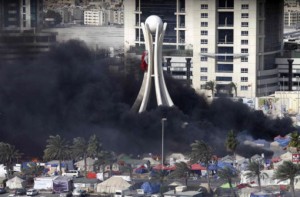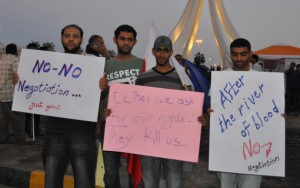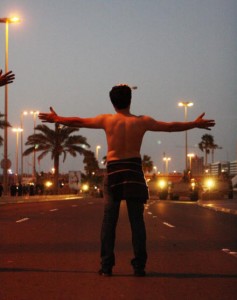An Interview with Jasmin – a Shi’a and Gay Man
An extended and updated version of an interview done on GayCityNews
by Dan Littauer
Gay Middle East.com Editor
April 4, 2011
As the tiny Persian Gulf archipelago kingdom of Bahrain enters its second month of widespread protests — with clashes on March 13 resulting in more than 1,000 being hospitalized and news that the government has brought in troops from neighbouring Saudi Arabia — a young gay Bahraini blogger offers insight into the sources of discontent there as well as alternative visions the demonstrators harbor.
 In a series of email exchanges, Jasim (not his real name), a 24-year-old man who identifies as both Shi’a and gay, reflected on the economic inequalities at the root of Bahraini discontent — conditions that, fuelled as well by the events in Tunisia and Egypt, have overwhelmed the traditional ruling elites’ effort to divide the populace along Shi’a-Sunni lines.
In a series of email exchanges, Jasim (not his real name), a 24-year-old man who identifies as both Shi’a and gay, reflected on the economic inequalities at the root of Bahraini discontent — conditions that, fuelled as well by the events in Tunisia and Egypt, have overwhelmed the traditional ruling elites’ effort to divide the populace along Shi’a-Sunni lines.
“Shi’a, Sunni, Christian, Atheist, Jewish, White, Black, Arab, Bedouin, Asian, Gay, Straight, etc… can all be loyal Bahrainis who love and want the best for their country,” wrote Jasim, who, significantly, named his blog loyalbahraini.wordpress.com. His cohesive social vision is likely a response both to Bahrain’s historical reality and to the efforts today to paint the conflict as one between Muslim sects.
“Many people say as I and others are Shi’a-Muslim, our loyalty is to Iran and not to our own country,” he wrote. “This makes me sad and angry: just because I am a Shi’a, that doesn’t mean I am related to any Iranian relations or come originally from Iran. I am a Bahraini, no matter what my religious division, ethnicity or sexuality is!”
In fact, until the late 18th century, Bahrain was a Persian province, and its population remains predominantly Shi’a. At that time, the British, looking to ensure their influence, installed the Sunni Arab Al Khalifa family-tribe, who had lost control of Qatar, as the nation’s rulers. For more than 200 years since, that non-Shi’a elite from outside Bahrain has ruled a largely disenfranchised majority.
Though the British role in Bahrain ended in 1971, succeeded by a constitutional monarchy, four years later, both the parliament and the constitution were suspended, and an authoritarian royal regime was established. The monarchy actively encouraged immigration by Sunni Muslims from neighbouring Arab states to dilute the power of the Shi’a majority. By the mid-1990s, however, popular discontent among Shi’a and secular forces spilled out into five years of often-violent protests.
King Hamad bin Isa Al-Khalifa, the current monarch, sued for peace after assuming the throne in 1999, with a National Charter that ostensibly restored constitutional rule and gave women the right to vote. However, only the parliament’s lower chamber, with largely consultative powers, is elected by the people; the king handpicks the members of the upper chamber. Significantly, in 2002, a general amnesty was granted to government officials previously accused of human rights abuses.
Today, Bahrain — which has huge strategic importance to the US as home to the United States Naval Forces Central Command/ Fifth Fleet — has a population of 1.2 million, less than half of whom are Bahraini nationals, the rest being migrant workers, often employed by the army and the police, many of them from South and Southeast Asia. Despite a carefully cultivated image as business-friendly open society, the 70 percent of citizens who are Shi’a are barred from significant public sector, police, and army posts and make up the poorest segment of society. The military is largely composed of Sunni Muslims, with Bahrainis commanding soldiers from Pakistan, Yemen, and Syria. While public policies favor new immigrants, Shi’a Bahrainis often face waiting lists of years for housing and wage competition from the migrant labor force.
Jasim reflected on that recent history.
“I want to let everyone know that protests have been going through the country concerning the ongoing inequality in the country and the poor standard of living in many of the villages in Bahrain, low salaries, and the discrimination against Bahrain’s own loyal citizens,” he wrote. “Protests have been undergoing since the 1980s, and such tragic events happened in the 1990s, but… the media were neglecting this poor side of Bahrain and were focusing on the posh, liberal, open to the world side of it! The National Charter that promised Bahrainis better living standards, decreasing the unemployment, a democratic constitutional monarchy, was all a diplomatic illusion to make the people shut up for a while.”
Jasim has been more fortunate than most Shi’a Bahrainis, having the opportunity to go to school in Europe, where he was first free to explore his sexuality. “I have lived all my life until I was 18 without practicing any gay activities in the kingdom (even though public school sex was quite popular since it was all-boys schools) but I didn’t do anything,” he recalled. “Although I knew I was gay from early adolescence, I just concentrated on studying and was unaware about websites for gay dating or anything… When I went to study in Europe, I started exploring my sexuality through websites, where I chatted with guys online, always careful about not being caught (and yes being caught is a BIG concern for me since I come from a Middle Eastern country).
After months of chatting with one man, they met for dinner and in time Jasim had his first gay sexual experience.
“From there on I started to feel much more comfortable about being gay and made a number of gay friends both in Europe and throughout the Arab world,” he said. “Back in Bahrain, however, I live a straight acting life here, where no one knows that I am gay, except one friend (long story!), and I continue to be ‚Äòstraight acting,’ doing my best to make up excuses when the pressure get to me from family and society to have a family of my own.”
Jasim’s education in Europe and his ability to taste the openly gay life of the West, however, did not blind him to the problems in his homeland.
“Discrimination gives the message that the country DO NOT trust the Shi’a, and it created a grudge between the Sunni and Shi’a,” he wrote. “What made it worse is that they bring people from outside the country and let them work in the army and the police and give them nationalities, while the people are not allowed just because of their Shi’a-Muslim origin!”
This disparate treatment, Jasim argues, does not emerge organically in Bahraini society; rather, he says, it is imposed by the government. “I have been raised since I was a kid that no matter what division you are, what religion, it doesn’t matter in life, all what matters is how good of a person you are to yourself and to everyone else,” he wrote. “I have been raised in a city that has a mixture of people from Shi’a, Sunni, and even Christian backgrounds. So as a kid growing up, I didn’t feel that sensitivity between Shi’a and Sunni…
“Mainly the discrimination happens in most of the public sector, army, and any high ranks among the police. This strategy made by the government, in my opinion, is the root for all this sensitivity. If that strategy would not have been there in the beginning, everyone will be like — Ah, Okay, I am a Bahraini citizen first: and not a Shi’a or Sunni!'”
By instigating, promoting, and provoking a Sunni/ Shi’a divide, the British Empire and later the Bahraini monarchy have asserted dominance and prevented a strong civil society and more egalitarian democratic state from emerging.
As Jasim explained, the events in Tunisia and Egypt dovetailed serendipitously with a significant anniversary in Bahrain. “After the events in Tunisia and Egypt, Bahraini people started on Facebook and Twitter discussing what they have called the 14th of Feb revolution, and the reason they chose 14th of Feb it was exactly a decade to the anniversary of The National Charter that offered a lot and delivered little but a cosmetic change,” he wrote.
In a statement posted online, Bahraini Youth for Freedom, responsible for mobilizing demonstrations, urged Bahrainis “to take to the streets on Monday 14 February in a peaceful and orderly manner” and to forum a popular forum to “investigate and hold to account economic, political and social violations, including stolen public wealth, political naturalisation, arrests, torture… [and] institutional and economic corruption.”
Jasim was present in the first days of the protests.
“I participated in the first three days,” he wrote. “On the 14th of February, there was a very small protest which grew bigger on Tuesday in my town of Bilad Al-Qadeem. Both went smoothly — we protested about the lack of rights of Bahraini people and ask for better living standards, democratic representation, and a call for a constitutional monarchy, to clean the corruption in the government, and stop the political strategy of changing the demography of the country… It was great to see that people from both genders, all ages, backgrounds came to show their support. We saw some reporters from CNN and BBC, but nothing from Bahrain media, sadly.”

Elsewhere, however, on February the 14th, a young 21-year-old Bahraini, Ali Abdul Hadi Mushaima, was shot dead. During his funeral, the next day, police opened fire, killing one person and injuring at least 25 others. The ensuing outrage led the main opposition group, Al-Wefaq, to suspend its participation in the parliament’s lower chamber.
Jasim offered his thoughts on the role of the opposition in the popular uprising: “Even though Al-Wefaq has a strong support in the Shi’a community in Bahrain, the protests have nothing to do with them from the start and it simply demonstrates the people frustration of being a second-class citizen… I, for example, has never followed Al-Wefaq party ideas since it doesn’t match my ideology.”
By the afternoon of February 14, thousands of protesters had gained control of the Pearl Roundabout in the capital city of Manama, establishing a tent city in emulation of Cairo’s Tahrir Square. “As for Wednesday, protesters come from all over the country, so the protest was considerably bigger,” Jasim wrote of the protest in the capital the following day. “If protests continued mostly in the villages, no one will even bother to go and check it out or give it any attention as was the case often in the past, especially during the ‘90s…
“My cousin and I went on Wednesday afternoon with signs of ‚ÄòNo Sunni, No Shi’a, We are Bahraini and we want to be treated as Bahrainis.’ Lots of media coverage from media centres OUTSIDE the country, but once again Bahrain TV and the main government media showed nothing, and didn’t report what’s going on there.
“The atmosphere there was very engaging and people were demonstrating that they want urgent actions from the government to start giving people their right, it was all peaceful, and was kinda a social thing, people chatting, and showing their support. We stayed for two hours, and it was very interesting as I have met many of my school friends.”
Jasim and his cousin were fortunate they chose not to stay in the roundabout overnight; at about 3 a.m. on February 17, riot police moved in, using tear gas, batons, and shotguns to disperse the protesters, many of whom were fast asleep. Five people died, including a two-year-old girl shot multiple times by police, while 231 sustained injuries and roughly 70 people were arrested.
“One of the victims was an old school friend who was a second year civil engineer student in the University of Bahrain,” Jasim wrote. “Ali was such a lovely, sweet, smart guy with such a positive spirit — everyone loved him. When I heard on Thursday that Ali is in the hospital after being gunned down by a shotgun in his thighs and the penis I WAS SHOCKED.”
After another bloody day on February 18, the army temporarily retreated, protesters returned to the Pearl Roundabout, and by February 22, a Martyrs March drew a crowd of 280,000 — a number representing more than 20 percent of all residents or one out of two Bahraini citizens. Since then, scrambled efforts at accommodation on the king’s part — the slashing of housing costs by 25 percent, a reshuffling of his cabinet — have failed to satisfy the opposition, and the protests continue.
What does Jasim himself hope will come of the protests?
“Equality, less corruption in the ministries (as I don’t believe that any government can be 100 percent free of corruption), a constitution that gives the people the right to help construct the country, stopping the political strategy of bringing people from outside and let them in the army while the Bahrainis cannot be in it,” he responded.
Saudis often call Bahrain “the bar,” because it’s the place they can easily reach and buy alcohol, meet people more freely, and indulge in the delights of prostitution — both male and female. Every weekend for more than two decades, thousands of Saudis have driven across the 15-mile-long causeway linking Bahrain’s main island to the Saudi mainland to enjoy the relative liberal atmosphere.
How do Bahraini gays fare in this climate, I ask Jasim.
“Bahrain is indeed a very liberal country comparing to the other gulf countries, and even tolerates prostitution as long as it is kept quiet and invisible,” he responded. “Towards homosexuality there is a kind of strange denial, in some places like Thai massage centres, its well known in the country that many gay guys go there for pleasure and such places remain open. So at some points, it seems everyone is giving the blind eye and ignoring that it exists, and other times they try to stop it !”
But really living as a gay man is impossible in Bahrain, as the recent trial of 52 men, out of a larger number arrested at a purportedly gay party in Bahrain’s second city, Muharaq — on charges of promoting immorality, debauchery, and prostitution — makes clear. Opposition Al-Wefaq members of the parliament’s lower house, in fact, raised questions about the “spread” of such “vice” with the king’s cabinet.
“It will be a long process till Bahrain can recognize any gay and lesbians rights,” Jasim wrote of the limits of his hopes for change in the short run. “I write this filled with sadness, really, as I don’t know how can you change this. Maybe we have to move slowly to a more civil society and openness before this issue can be addressed gradually. Perhaps a new constitution, if our demands are met, can at least remove the references to immorality and other clauses used against us… I also believe in the power of media, that can at least gives the young generation hope that they are not alone.
While the media has been focusing on Libya and to a lesser extent Syria, we hear little about Bahrain in the West. Has the government’s strategy changed or intensified in any way in during the month of March?
“The situation in Bahrain has gone from bad to worse !! Once the government noticed that the protestors are demanding their rights and won’t stop until they get what they deserve ( a constitutional monarchy, fair treatment to all the people especially regarding joining the army and the police forces, better infrastructure to the villages in the kingdom, etc etc ) the government chose to shut the people and create tensions between the Sunni and Shi’a, and portraying the latter as having loyalty to Iran, and that they only want to following in the Iranian Islamic revolution steps !! This excuse is the illusionary card that the whole region uses whenever they feel that the people wants their rights and sick of being ruled by one family for nearly 50 years now !!
The strategy of Bahrain and other Gulf Cooperation Council (GCC) countries are playing is to make everyone believe that all those governments are doing, is protecting the country from the Shia !! Forgetting that the Shia have actually been in Bahrain the longest since the transformation from Delmon and Taylus civilizations, Arbian gulf, to Bahrain !!! The protests started and finished with people holding the flag of Bahrain, screaming ” No shia, No sunni, we are Bahraini want our rights “, demanding a constitutional monarchy, better living, and an end to corruption in the government. And not a single word or flag of Iran !! So simply how can a whole nation speak and accuse the shia of this while they can see that none of those lies are happening !!”
Jasim is scathing about the intervention of Saudi Arabia, and other Gulf Cooperation Council (GCC) countries. He also illuminates other tactics being adopted by the Bahraini government:
“Since Saudi Arabia are great allays with the Al-khalifa family, two weeks ago, invited troops from other GCC countries (mainly Saudi ) to force the people stop protesting ( Such democracy we have it seems !! ) Many people got injured, and the government played this scenario where they actually took the injured people from the main hospital Salminya to the military hospital in Awali !! So they can “SHOW” the media that there are no injured from the evacuation of the protestors and no one is in the main hospital Salminya !! Since then the government had a curfew in most of the country (mostly villages) where protestors live, that no one can go out from 6 pm until 5am in the morning !! All over Bahrain there are now LOTS of inspection points, loads of people got arrested, personally I know many people got arrested from my friend’s families. And sadly the government was able to incite a sectarian grudge between Shi’a and Sunni partly by using the media in Bahrain (the ones controlled by the government to divert the people eyes from the truth and let them believe its all about Shi’a disloyalty in the country).

The situation has been pretty bad: many people got fired from their jobs, lots of arrested people, my family has been stuck inside the house afraid that if they go out they will be attacked and abused just because of their religious background; I simply cannot express how I feel.”
“What about the west”, I ask Jasim, “what do you make of its silence on the matter?”
“I believe its quite clear why the West is reluctant to get involved with the situation in Bahrain. Simply because the monsters we have in Bahrain ruling the country, are the West’s best friends, with all the benefits and good relationships the Khalifa family have to the West. So it has no reason to intervene and destroy their relationship. First they won’t intervene for the sake of the protestors, as the benefits are already been provided to them by Al-khalifa family and the business in the country. And of course they are not stupid to commit a political suicide and gives the Bahraini government worldwide support to kill and use force to shut the protestors up !! As the world has already seen , with the fast growing and open technology communication we have here through unbiased channels and social network sites, that the protestors happened because of the unfairness in this country. So the west are playing the neutral position where they won’t show support publicly to any side !!”
So now the Bahraini government shut the only Independent paper down, what is going on?
“Al-wasat newspaper was constructed by one of the active politicians in the country, Mansour Al-Jamri, and since then it has been reporting fair articles about the life and society in Bahrain without the government’s intervention to twist the truth. When the protests happened, the newspaper was delivering the actual truth of what was going on, the people’s demands, and what actually the government did to those protestors !! So the government then accused the newspaper of allegedly fabricating lies. Sadly, the Bahrain national channel BTV, Al-ayam and Akhbar Alkhaleej newspapers are biased newspapers under the control/influence of the government, where they are simply doing what the government tell them to do, no matter what the truth is. For the people of Bahrain, everyone lost faith in such media channels as everyone knew they are twisting the truth and not reporting honestly of what’s going on !!”
I ask Jasim if he thinks the Bahraini government will be able to hold off the revolution.
“Bahrain was able to hold off the revolution three times before, 80s twice, and in the 1990’s. Lots of sacrifices and no intervention or help from the outside, the situation looks like it will be repeated just like the unfortunate events in the 1984, 1989 and the 1994.”
Originally published here: www.gaymiddleeast.com/news/news%20283.htm
















